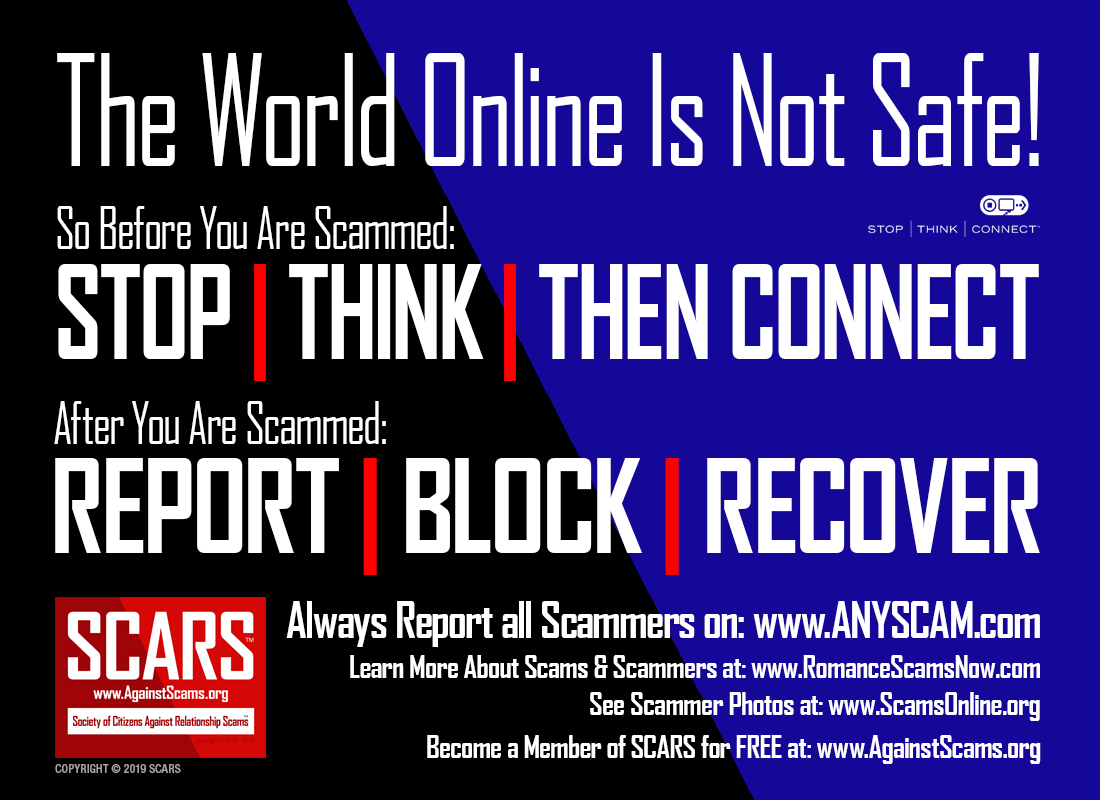Are Victims Fraudsters Too?
Here is a question to ask yourself: Did you commit fraud while you were scammed?
- Did you lie to others to get money to send the scammer?
- Did you lie to others to send money to your scammer?
You do not need to respond to this post if you do not want to. But just answer it for yourself honestly!
This is one of those very difficult questions that eats at your soul.
There are THREE potential ways you – a scam victim – may have committed fraud as a part of your scam:
LIED TO SEND MONEY
At a minimum, almost every scam victim lies about knowing the scammer when sending money through services like Western Union and Moneygram. These services are fully aware of how they are being used by criminals to launder money and ask specific questions to help victims see the light, but it also protects them since they both had to repay hundreds of millions of dollars to victims over their past failures.
By saying they really know the scammer, the victim lied. That is wire fraud.
It is very unlikely that you would ever be prosecuted, but it complicates everything. You need to understand this when expecting law enforcement to help you.
LIED TO GET MONEY
Very often, victims borrow money from friends and family, never telling them the truth or why they really wanted it/needed it. In other words, they lie to them.
So naturally, after the scam, it is difficult to come out and admit the scam because of the lies or fiction that was told to others. This is also the basis of a lot of the shame and guilt that victims feel.
At some point a victim has to admit to this and ask for forgiveness, otherwise, it destroys the relationship and results in the permanent loss of trust. Of course, even after admitting it, your friends and family are unlikely to ever give you money again, but at least you can work on your recovery with a cleaner conscience.
BECAME A MONEY MULE
Becoming a money mule is actually a criminal offense and hundreds of them are now prosecuted every year in the United States alone. It is criminal because the mule is laundering stolen money (or other property) for online criminals.
Mules receive money (or property) from other victims and forward it to the scammers, or they allow the scammer to access and use their financial accounts (credit cards and banking).
Law enforcement and prosecutors are growing increasingly intolerant of money or parcel mules since they are sustaining these criminal enterprises. All major global law enforcement agencies are arresting mules regularly that do not come forward and cooperate. If a mule really did not know they were being used, then they are not likely to face criminal charges – but they must report their participation to the police. If they do not and are discovered – which they will be – then they face charges for money laundering and possibly obstruction of justice for hiding the crime, and even being an accessory to the crime.
VERY IMPORTANT
If you did any of these, we strongly recommend that you contact an attorney for professional legal advice. Do not simply accept something you read online, as your future freedom may be at stake. You may also be facing significant civil liability – as in the people you harmed can sue you.
Admitting The Truth
Alcoholics Anonymous has a step where alcoholics must admit the harm they caused others as a critical step in their recovery. But the reason it is so important is to remove the guilt that causes further life-long trauma and guilt. That guilt is toxic, but it is easily removed.
By admitting the truth – hard as it is – you can free your soul, cast aside the shame and the guilt. It does not mean that some shame will not remain, but you have been truthful with people you lied to. This is cathartic and therapeutic.
It does not mean that things will be ok between you and them, in fact, they will probably not trust you for a while, but in your heart, you know you have finally been honest. You also give permission to your friends and family to forgive you. If you maintain the lies, how can anyone forgive you?
A dishonest life is what we expect from scammers, not for ourselves. No one should have to sustain this burden when it can be relieved by just telling the truth to those affected.
If you want to respond to this post, just respond in one way: that you pledge to be truthful with everyone!
Just remember truth is not attitude or anger – those are the wrappers around your truth – the truth is not about other people – your truth is only about yourself!
This is one of the reasons why our organization is adamant about people engaging in deception against scammers (Scam Baiting,) because there is no justification for victims to turn themselves into scammers. If you do what scammers do, then you become them.
Recovery Begins With You
Remember, no one can fix or save you. This comes from within and begins with the truth about what happened, what part you playing in beginning it, and sustaining it. This is not about blame but about truth. You cannot recover from something, much less avoid it in the future, if you cannot truthfully admit what happened. In this case the truth does set you free, painfully at first, but in the end, you shed the burden and can live with yourself.
We are here to help you if you will let us – through our scam victim support groups and forums.
TAGS: SCARS, The Truth, Victims Commit Fraud, Lying To Others, Victims Recovery, Scam Victim Recovery, Admitting The Truth, Forgiveness, Information About Scams, Anti-Scam, Scams, Scammers, Fraudsters, Cybercrime, Crybercriminals, Romance Scams, Scam Victims,
SCARS™ Team
Society of Citizens Against Relationship Scams Inc.
A Worldwide Crime Victims Assistance Nonprofit Organization
Visit: www.AgainstScams.org
Contact Us: Contact@AgainstScams.org
PLEASE SHARE OUR ARTICLES WITH YOUR FRIENDS & FAMILY
HELP OTHERS STAY SAFE ONLINE – YOUR KNOWLEDGE CAN MAKE THE DIFFERENCE!
The Latest SCARS Posts:
FIND MORE SCAM NEWS
«SCAMCRIME.COM»
JOIN US ON FACEBOOK
«CLICK HERE»
END
MORE INFORMATION
– – –
Tell us about your experiences with Romance Scammers in our
« Scams Discussion Forum on Facebook »
– – –
FAQ: How Do You Properly Report Scammers?
It is essential that law enforcement knows about scams & scammers, even though there is nothing (in most cases) that they can do.
Always report scams involving money lost or where you received money to:
- Local Police – ask them to take an “informational” police report – say you need it for your insurance
- U.S. State Police (if you live in the U.S.) – they will take the matter more seriously and provide you with more help than local police
- Your National Police or FBI « www.IC3.gov »
- The SCARS|CDN™ Cybercriminal Data Network – Worldwide Reporting Network on « www.Anyscam.com »
This helps your government understand the problem, and allows law enforcement to add scammers on watch lists worldwide.
– – –
To learn more about SCARS visit « www.AgainstScams.org »
Please be sure to report all scammers
on « www.Anyscam.com »
Disclaimer:
SCARS IS A DIGITAL PUBLISHER AND DOES NOT OFFER HEALTH OR MEDICAL ADVICE, LEGAL ADVICE, FINANCIAL ADVICE, OR SERVICES THAT SCARS IS NOT LICENSED OR REGISTERED TO PERFORM.
IF YOU’RE FACING A MEDICAL EMERGENCY, CALL YOUR LOCAL EMERGENCY SERVICES IMMEDIATELY, OR VISIT THE NEAREST EMERGENCY ROOM OR URGENT CARE CENTER. YOU SHOULD CONSULT YOUR HEALTHCARE PROVIDER BEFORE FOLLOWING ANY MEDICALLY RELATED INFORMATION PRESENTED ON OUR PAGES.
ALWAYS CONSULT A LICENSED ATTORNEY FOR ANY ADVICE REGARDING LEGAL MATTERS.
A LICENSED FINANCIAL OR TAX PROFESSIONAL SHOULD BE CONSULTED BEFORE ACTING ON ANY INFORMATION RELATING TO YOUR PERSONAL FINANCES OR TAX RELATED ISSUES AND INFORMATION.
This content and other material contained on the website, apps, newsletter, and products (“Content”), is general in nature and for informational purposes only and does not constitute medical, legal, or financial advice; the Content is not intended to be a substitute for licensed or regulated professional advice. Always consult your doctor or other qualified healthcare provider, lawyer, financial, or tax professional with any questions you may have regarding the educational information contained herein. SCARS makes no guarantees about the efficacy of information described on or in SCARS’ Content. The information contained is subject to change and is not intended to cover all possible situations or effects. SCARS does not recommend or endorse any specific professional or care provider, product, service, or other information that may be mentioned in SCARS’ websites, apps, and Content unless explicitly identified as such.
The disclaimers herein are provided on this page for ease of reference. These disclaimers supplement and are a part of SCARS’ website’s Terms of Use.
Legal Notices:
All original content is Copyright © 1991 – 2020 Society of Citizens Against Relationship Scams Inc. (D.B.A SCARS) All Rights Reserved Worldwide & Webwide. Third-party copyrights acknowledge.
SCARS, SCARS|INTERNATIONAL, SCARS, SCARS|SUPPORT, SCARS, RSN, Romance Scams Now, SCARS|INTERNATION, SCARS|WORLDWIDE, SCARS|GLOBAL, SCARS, Society of Citizens Against Relationship Scams, Society of Citizens Against Romance Scams, SCARS|ANYSCAM, Project Anyscam, Anyscam, SCARS|GOFCH, GOFCH, SCARS|CHINA, SCARS|CDN, SCARS|UK, SCARS|LATINOAMERICA, SCARS|MEMBER, SCARS|VOLUNTEER, SCARS Cybercriminal Data Network, Cobalt Alert, Scam Victims Support Group, are all trademarks of Society of Citizens Against Relationship Scams Inc., All Rights Reserved Worldwide
Contact the law firm for the Society of Citizens Against Relationship Scams Incorporated by email at legal@AgainstScams.org












Leave A Comment